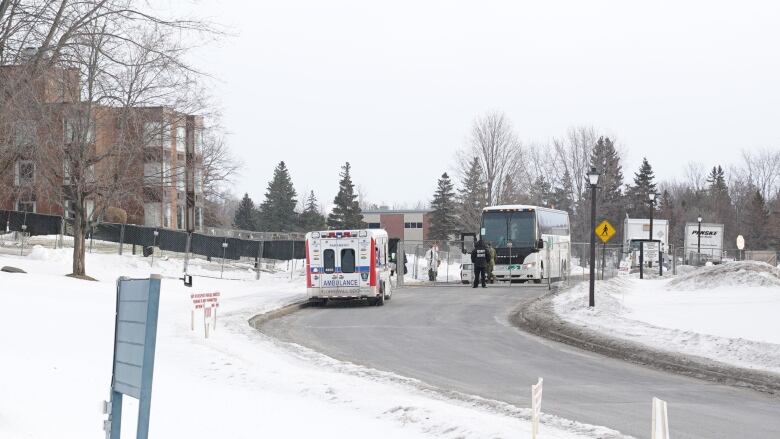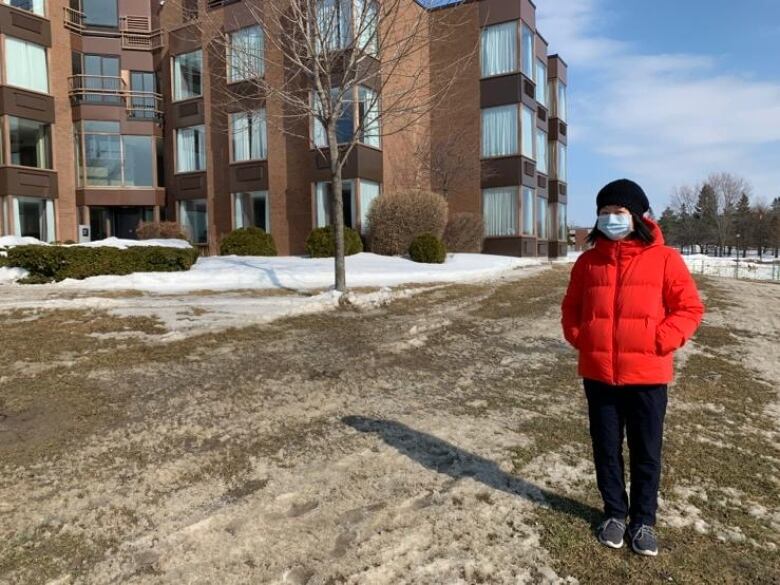Fear around coronavirus spreading in Cornwall, top doctor cautions
Children of Nav Centre employees 'bullied' at school, councillors told

There's something spreading in Cornwall, Ont., but it's not coronavirus it's fear and misinformation about the outbreak, according to eastern Ontario's medical officer of health.
On Friday, 129 Canadians who were aboard the Diamond Princess cruise shipbegan a 14-daycoronavirusquarantineat Cornwall'sNav Centre.
- 'We just keep to ourselves': Couple waiting out coronavirus quarantine a day at a time
- Cruise ship passengers begin 14-day quarantine in Cornwall, Ont.
- Here's what the rooms at the NavCentre look like
According to Dr. Paul Roumeliotis, medical officer of health and chief executive officer of the Eastern Ontario Health Unit, only federal employees and Red Cross volunteers are delivering services to the quarantined guests. Nav Centre staff don't interact with them in any way, and "staff and their families are not at increased risk of infection or of spreading the virus," he confirmed in an email to CBC.
Nevertheless, some people are taking unnecessary precautions, Roumeliotis told Cornwall city councilMonday.
I'm also getting phone calls from schools saying the kids are being bullied now because aparent works at Nav Centre.- Dr. Paul Roumeliotis
"Some parents are refusing to send their kids to daycare and to schools because [there are children there whose]parents work at Nav Centre," he said.
"I'm also getting phone calls from schools saying the kids are being bullied now because aparent works at Nav Centre," he said.
Roumeliotis said he also had to allay the fears of the employees themselves.
"The Nav Centre employees were quite worried, and I spent a lot of time speaking to them," he said."There's absolutely no risk to them. There's no way that somebody working ... a thousand metres away from the quarantine zone, which is blocked off completely, can transfer that virus. There's no way."
Roumeliotis said he would be sending out letters to parents in Cornwall to explain the situation.

Roumeliotis said there is also "no increased risk" to visitors to the centre, or to the general public, of contracting the virus.
A company has been hired to cleanand disinfect the rooms where the quarantined guests are staying. Its employees wash bedding and towels, but guests are responsible for washing their own clothes using theonsite facilities.
Food is prepared onsite, but it's not delivered by Nav Centre staff and comes with disposable containers and utensils.
The quarantined guests are allowed outsideunder supervision, butmust wear masks and gloves, and must keep a certain distance from one another.

"For now, our risk in Canada, our risk in eastern Ontario [of contracting COVID-19], with or without the passengers at the NavCentre, remains low," Roumeliotis said.
While there have been clusters of the respiratory illnessin other countriesincludingItaly and Iran, Roumeliotis said he's more worried about the spread of the flu in eastern Ontario, where there have been nine or 10 outbreaks in the Cornwall area, including three in daycares.
Just like with any respiratory illness, health officials are urging people to wash their hands well and often, and to cough into their sleeves.
Roumeliotis has daily phone calls with the chief of staff of the Cornwall Hospital, but said the vast majority more than 80 per cent of patients who get the respiratory illness would likely stay home.
In the event someone does need to behospitalized, protocols are in place, he said.
"It's not unlike if we had a patient who had the flu," Roumeliotis said. "I'm not worried about it just because it's a novel virus. The containment procedures are the same."












_(720p).jpg)


 OFFICIAL HD MUSIC VIDEO.jpg)
.jpg)



























































































